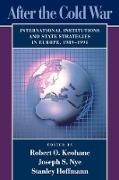En savoir plus
Equally grounded in theory and extensive empirical research, this volume offers a description and interpretation of the changing world order. In both its approach and its conclusions, it aims to serve as a model for the study and conduct of international relations in a new era.
Table des matières
Introduction: The End of the Cold War in Europe Robert O. Keohane and Joseph S. Nye I. Strategies of Major Powers 1. Mars or Minerva? A United Germany in a Post-Cold War Europe Jeffrey J. Anderson and John B. Goodman 2. Soviet Security Strategies toward Europe: After the Wall, with Their Backs up against It Celeste A. Wallander and Jane E. Prokop 3. The United States and International Institutions in Europe after the Cold War Joseph S. Nye and Robert O. Keohane 4. French Dilemmas and Strategies in the New Europe Stanley Hoffmann 5. British State Strategies after the Cold War Louise Richardson II. Adjustment and Adaptation in Eastern Europe 6. Integrating the Two Halves of Europe: Theories of Interests, Bargaining, and Institutions Stephan Haggard, Marc A. Levy, Andrew Moravcsik, and Kalypso Nicolaidis 7. East European Trade in the Aftermath of 1989: Did International Institutions Matter? Kalypso Nicolaidis 8. The Political Economy of Financial Assistance to Eastern Europe, 1989-1991 Stephan Haggard and Andrew Moravcsik 9. Foreign Direct Investment in Eastern Europe Debora L. Spar 10. East-West Environmental Politics after 1989: The Case of Air Pollution Marc A. Levy 11. Pursuing Military Security in Eastern Europe Richard Weitz Conclusion: Structure, Strategy, and Institutional Roles Robert O. Keohane and Stanley Hoffmann Notes Contributors Index
A propos de l'auteur
Robert O. Keohane is Professor of International Affairs at the Woodrow Wilson School of Public & International Affairs, Princeton University.Joseph S. Nye, Jr., is Dean of the Faculty and Don K. Price Professor of Public Policy at the John F. Kennedy School of Government at Harvard University.Stanley Hoffmann (1928–2015) was Paul and Catherine Buttenwieser University Professor at Harvard University.
Résumé
Bringing together the work of seasoned experts and younger scholars, this volume offers a wide-ranging analysis of the effects of historical patterns—whether interrupted or intact—on post–Cold War politics. Equally grounded in theory and empirical research, this volume offers a lucid description and interpretation of our changing world order.

